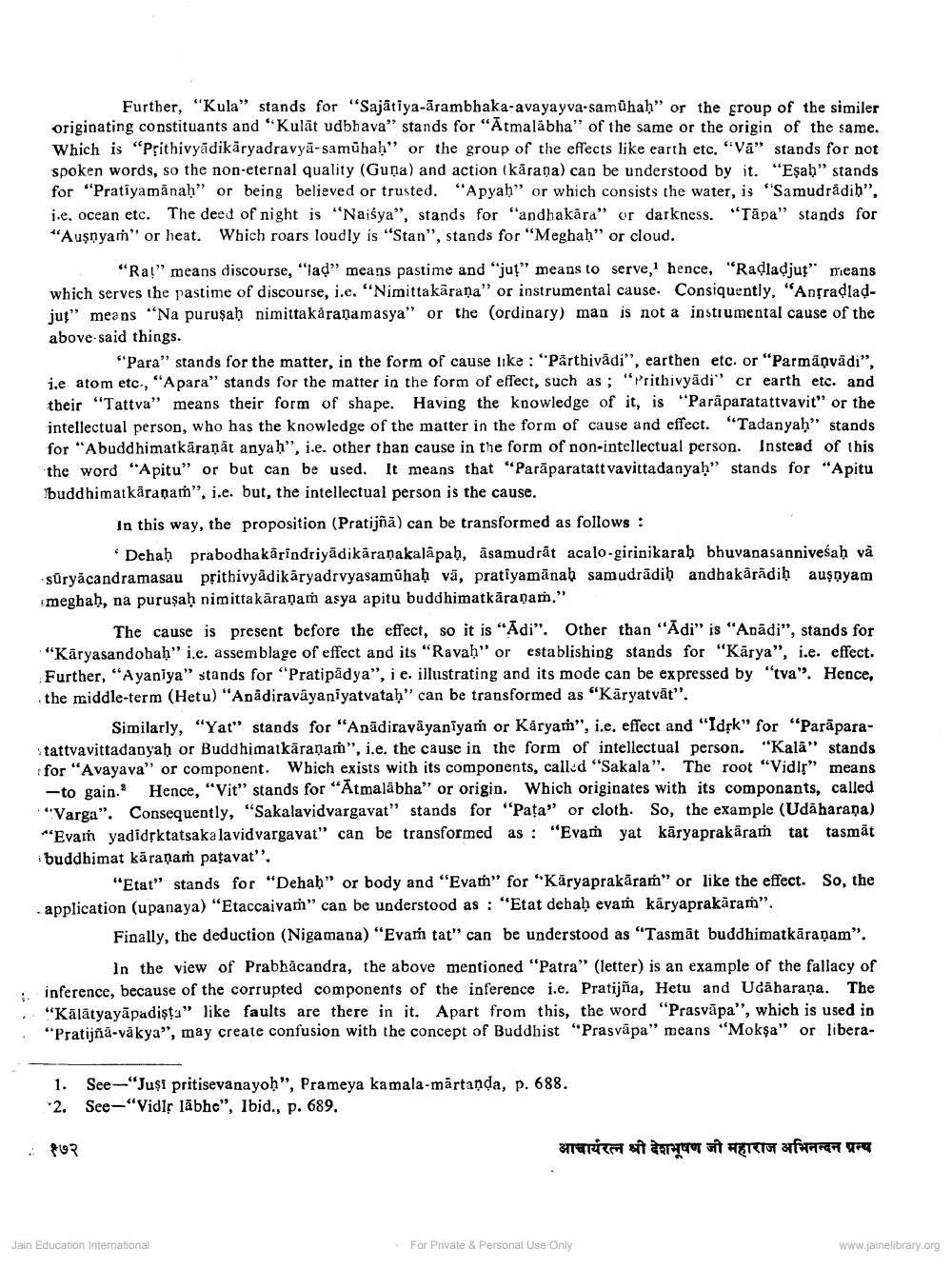Book Title: Style of writing for Debate in Indian Philosophy Author(s): Bhishan Swarup Rastogi Publisher: Z_Deshbhushanji_Maharaj_Abhinandan_Granth_012045.pdf View full book textPage 4
________________ 1. Further, "Kula" stands for "Sajātiya-arambhaka-avayayva-samühaḥ" or the group of the similer originating constituants and "Kulat udbhava" stands for "Atmalabha" of the same or the origin of the same. Which is "Prithivyādikāryadravya-samühaḥ" or the group of the effects like earth etc. "Vā" stands for not spoken words, so the non-eternal quality (Guna) and action (karaṇa) can be understood by it. "Eṣaḥ" stands for "Pratiyamanaḥ" or being believed or trusted. "Apyah" or which consists the water, is "Samudradiḥ", i.e. ocean etc. The deed of night is "Naisya", stands for "andhakara" or darkness. "Tapa" stands for "Ausnyam" or heat. Which roars loudly is "Stan", stands for "Meghaḥ" or cloud. "Ra!" means discourse, "lad" means pastime and "jut" means to serve, hence, "Radladjut" means which serves the pastime of discourse, i.e. "Nimittakarana" or instrumental cause. Consiquently, "Anṛraḍladjut" means "Na puruşaḥ nimittakaranamasya" or the (ordinary) man is not a instrumental cause of the above said things. "Para" stands for the matter, in the form of cause like: "Parthivadi", earthen etc. or "Parmaṇvādi”, i.e atom etc., "Apara" stands for the matter in the form of effect, such as; "Prithivyädi" cr earth etc. and their "Tattva" means their form of shape. Having the knowledge of it, is "Paraparatattvavit" or the intellectual person, who has the knowledge of the matter in the form of cause and effect. "Tadanyaḥ" stands for "Abuddhimatkāraṇāt anyaḥ", i.e. other than cause in the form of non-intellectual person. Instead of this the word "Apitu" or but can be used. It means that "Paraparatatt vavittadanyaḥ" stands for "Apitu buddhimatkāraṇam", i.e. but, the intellectual person is the cause. In this way, the proposition (Pratijñā) can be transformed as follows: 'Dehab prabodhakarindriyädikaranakalāpab, asamudrat acalo-girinikarab bhuvanasannivesab và suryacandramasau prithivyâdikäryadrvyasamühab vä, pratlyamänab samudrädib andhakaridib ausoyam meghaḥ, na puruşaḥ nimittakaraṇam asya apitu buddhimatkāraṇam." The cause is present before the effect, so it is "Adi". Other than "Adi" is "Anadi", stands for "Karyasandohaḥ" i.e. assemblage of effect and its "Ravaḥ" or establishing stands for "Karya", i.e. effect. Further, "Ayaniya" stands for "Pratipadya", i e. illustrating and its mode can be expressed by "tva". Hence, the middle-term (Hetu) "Anadiravayaniyatvataḥ" can be transformed as "Kāryatvāt". Similarly, "Yat" stands for "Anadiravayaniyath or Karyath", i.e. effect and "Idrk" for "Paraparastattvavittadanyah or Buddhimatkaraṇam", i.e. the cause in the form of intellectual person. "Kala" stands for "Avayava" or component. Which exists with its components, called "Sakala". The root "Vidlr" means -to gain. Hence, "Vit" stands for "Atmaläbha" or origin. Which originates with its componants, called "Varga". Consequently, "Sakalavidvargavat" stands for "Pața" or cloth. So, the example (Udaharana) "Evam yadidṛktatsaka lavidvargavat" can be transformed as: "Evam yat karyaprakaram tat tasmät buddhimat kāraṇam paṭavat". "Etat" stands for "Dehah" or body and "Evam" for "Karyaprakaram" or like the effect. So, the application (upanaya) "Etaccaivam" can be understood as: "Etat dehaḥ evam käryaprakaram". Finally, the deduction (Nigamana) "Evam tat" can be understood as "Tasmat buddhimatkāraṇam". In the view of Prabhācandra, the above mentioned "Patra" (letter) is an example of the fallacy of inference, because of the corrupted components of the inference i.e. Pratijña, Hetu and Udaharana. The "Kalatyayapadişṭa" like faults are there in it. Apart from this, the word "Prasvapa", which is used in "Pratijñā-vakya", may create confusion with the concept of Buddhist "Prasvapa" means "Mokşa" or libera See-"Just pritisevanayob", Prameya kamala-märtanda, p. 688. 2. See "Vidlṛ läbhe", Ibid., p. 689. १७२ Jain Education International आचार्य रत्न श्री देशभूषण जी महाराज अभिनन्दन ग्रन्थ For Private & Personal Use Only www.jainelibrary.orgPage Navigation
1 2 3 4 5 6
